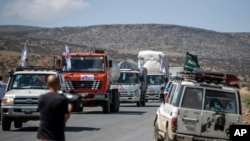Doctors Without Borders (MSF) said Friday that three of its aid workers have been found dead near their vehicle in Ethiopia’s embattled Tigray region.
“No words can truly convey all our sadness, shock and outrage against this horrific attack,” the medical charity said in a statement. “Nor can words soothe the loss and suffering of their families and loved ones, to whom we relay our deepest sympathy and condolences.” MSF said it lost contact with the staffers Thursday, and Friday morning their vehicle was found empty, and their bodies were found a few meters from it.
They identified the victims as Maria Hernandez, 35, MSF’s emergency coordinator who is a Spanish national; Yohannes Halefom Reda, 31, assistant coordinator and an Ethiopian national; and Tedros Gebremariam Gebremichael, 31, their driver and also an Ethiopian citizen.
“The death of Maria, Yohannes and Tedros is a devastating blow to all of us, both in Ethiopia and in the other countries where we operate around the world,” MSF said in the statement.
U.N. Secretary-General Antonio Guterres said in a statement Saturday he was “deeply shocked by the murder.”
“This is totally unacceptable and an appalling violation of International Humanitarian Law. The perpetrators must be found and severely punished,”
Guterres added. “I stand in solidarity with our humanitarian partners who are risking their lives to provide protection and relief to people in Tigray.”
International Committee of the Red Cross (ICRC) official Nicolas Von Arx said in a statement Saturday that “I can’t describe the shock we all felt to hear this devastating news. MSF personnel work tirelessly to help people who urgently need their humanitarian work.”
The ICRC statement also said, “Attacks against humanitarian and health workers seriously undermine the capacity of humanitarian organizations to deliver urgent assistance in the Tigray region, where humanitarian needs continue to grow.”
The ICRC statement reminded “Security forces and all weapon bearers” that they have a responsibility “to respect and protect medical personnel and humanitarian workers providing services in situations of armed violence.”
U.N. Spokesman Stephane Dujarric noted Friday that aid workers are too often targeted with the intention of scaring away humanitarians.
Tigray has been the center of hostilities since November, when fighting broke out
between the Tigray People’s Liberation Front and the government of Ethiopian Prime Minister Abiy Ahmed.
The fighting has exacerbated an already complex humanitarian situation in Tigray, where some 350,000 people are facing famine and at least 4 million others are coping with severe hunger. Aid groups have appealed for access, but they are often denied it by armed groups.
U.N. High Commissioner for Refugees Filippo Grandi urged parties to the conflict to protect the safety of both civilians and humanitarians on the ground in a statement earlier Friday.
“Civilians, including refugees have suffered enough and UNHCR and other humanitarian agencies must be allowed to help them,” Grandi said. “Only improved security and entry and access throughout Tigray will allow UNHCR and other humanitarian partners to carry out our mandate to assist those desperately in need.”




